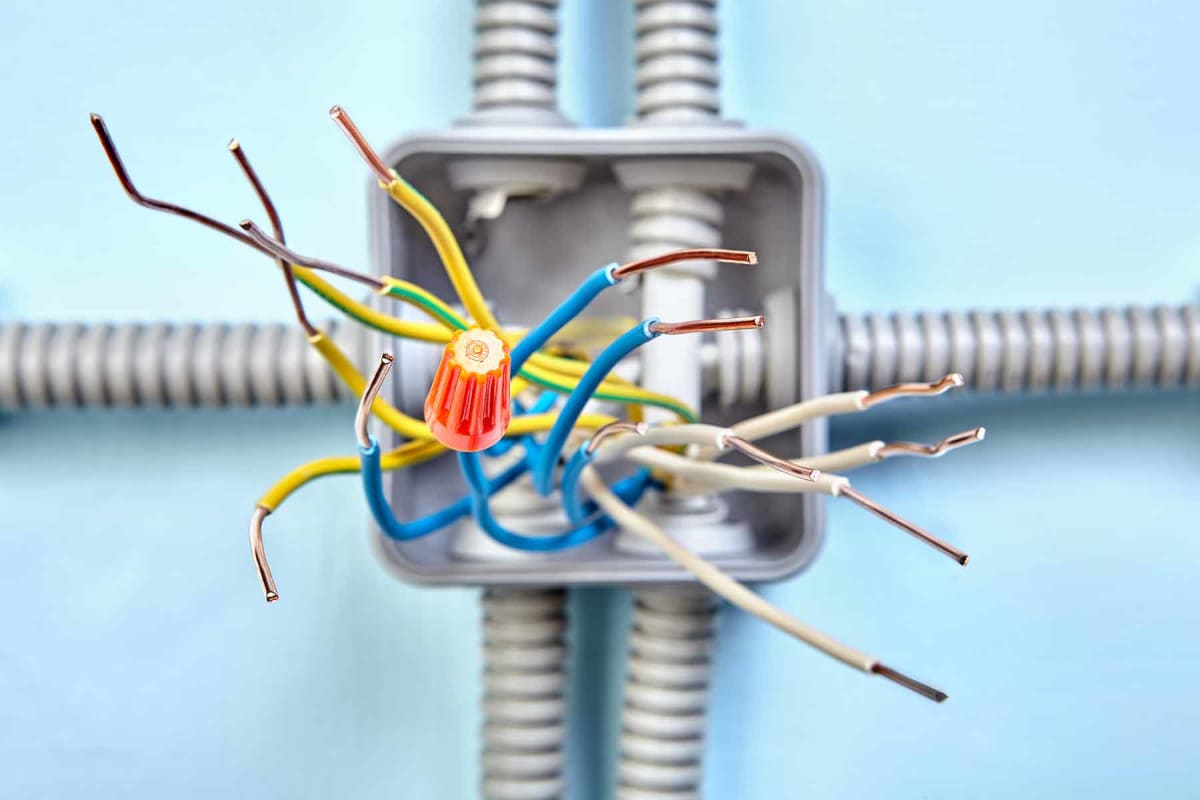
How much does it cost to install a junction box?
How much does it cost to install a junction box?
$100 – $300 average cost to install junction box
Junction box installation cost
Junction box installation costs $100 to $300 for parts and labor, depending on the installation location, accessibility, and the electrical box size, material, and indoor or outdoor rating. Plastic junction boxes for indoor wiring cost 50% to 80% less than metal boxes but aren't as durable.
| National Average Cost | $200 |
| Minimum Cost | $50 |
| Maximum Cost | $1,200 |
| Average Range | $100 to $300 |
Cost data is from research and project costs reported by HomeGuide members.
Spliced wires must be housed in a junction box, according to National Electric Code (NEC).
Junction box installation is typically part of a larger electrical project, such as installing a new light switch or wiring a new ceiling fan.
Cost breakdown to install a junction box
| Factor | Average cost (indoor) | Average cost (outdoor) |
|---|---|---|
| Junction box and supplies | $10 – $130 | $70 – $450 |
| Installation labor | $90 – $170 | $380 – $450 |
| Total cost to install | $100 – $300 | $450 – $900 |
The following factors impact the cost to install an electrical junction box:
Metal vs. plastic – Plastic boxes cost the least but can only be used with non-metallic cable. Metal boxes are more durable and more impact- and temperature-resistant.
Accessibility – Labor costs increase for installations in tight locations, such as narrow attic spaces.
Mounting location – Underfloor junction boxes typically cost more to install than stud-mounted boxes.
Indoor vs. outdoor – Outdoor junction boxes cost 40% to 80% more than indoor boxes as they must be weatherproof. In addition, outdoor box installation typically takes longer, increasing labor costs.
Number of boxes – Electricians typically charge less per box when installing multiple junction boxes at the same time as part of a larger electrical project.
Electrical project – Extending wiring to install a new light switch, ceiling fan, appliance, or chandelier typically requires at least one junction box. Electricians include the junction box cost in the project estimate.
Light switch – Light switch installation costs $100 to $300. Replacing an existing light switch costs $50 to $250.
Ceiling fan – Ceiling fan installation costs $150 to $350,including the fan and labor.
Chandelier – Chandelier installation costs $220 to $3,400 for labor and the chandelier itself.
Junction box materials cost
Junction box prices are $10 to $450 for the part alone, depending on the size, material, and whether the box is weatherproof. Plastic junction boxes cost 50% to 80% less than metal boxes but aren't as durable. Large 12"x12" boxes cost three to five times more than small 4"x4" boxes.
| Type | Average cost* | Use when |
|---|---|---|
| Plastic indoor junction box | $10 – $130 |
|
| Metal indoor junction box | $50 – $220 |
|
| Metal weatherproof junction box | $70 – $450 |
|
*Not including installation.
Labor cost to install a junction box
Electricians charge $50 to $130 per hour labor to install a junction box, depending on their location and experience. Most electricians also charge a $100 to $200 trip fee, which is typically applied to the first hour.

What is a junction box?
A junction box is a plastic or metal electrical box used to house wire splices. A junction box protects the wire connections from the elements, allows circuits to safely split and branch in other directions, and provides electricians with easy access for repairs or additions.
Junction boxes add safety by preventing electrical shock and containing sparks to prevent an electrical fire. According to National Electrical Code (NEC), metal junction boxes must be grounded, while non-conductive plastic junction boxes do not require grounding.
When do you need to install a junction box?
Whenever you splice wires together, you must install a junction box to contain the splice, according to National Electric Code (NEC).
Can you use a junction box to extend wiring?
Yes, a junction box is specifically designed to extend wiring. If the existing wiring does not reach the intended outlet or fixture, electricians splice an extension wire to extend the length and install a junction box to contain the splice.
How many junction boxes per circuit?
There is no limit on the number of junction boxes per circuit. However, the box's size determines the number of connections it can contain, according to National Electric Code. Many junction boxes are stamped with their maximum volume.
Do junction boxes need to be accessible? Can you bury or hide them?
Junction boxes must be easily accessible and the cover must be completely exposed, according to National Electric Code. You can't drywall over a junction box as it would be a dangerous fire hazard and would prevent an electrician from accessing the box without cutting through the drywall.
You can bury a junction box underground if it is surrounded by an NEC-approved material, but the cover must remain exposed and easily accessible.
Getting estimates from electricians
Before hiring an electrical repair service near you, be sure to:
Get three estimates to compare.
Read their reviews on HomeGuide and Google.
Hire a licensed, bonded, and insured electrician that has been in business for 5+ years.
Avoid choosing the lowest quote as quality may suffer.
Get a detailed contract, estimate, and warranty in writing before the work begins.
Never pay in full before the project is complete.
Questions to ask
How long have you been in business?
Are you licensed, bonded, and insured?
Can you provide local references with contact information?
Will the project require a permit? If yes, does the estimate include all permit fees?
What additional costs should I expect?
How long will the installation take?
Do you offer a warranty? If yes, what does it cover?